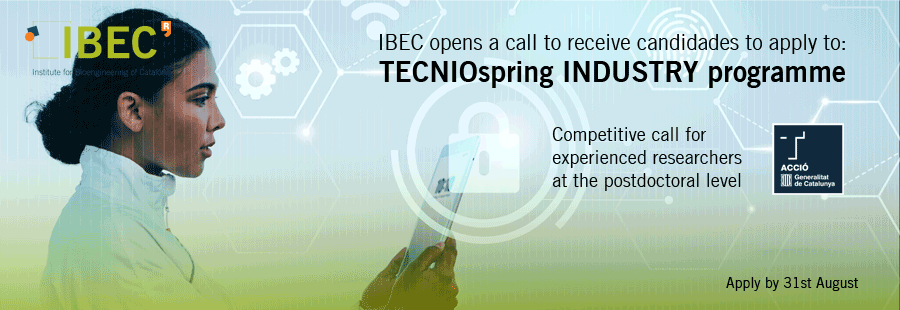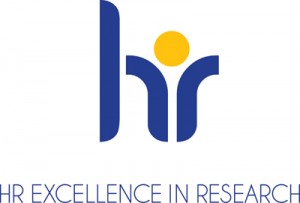
If you are interested in apply, please proceed as follows:
- Send the following documentation to: jobs@ibecbarcelona.eu before the 31st of August 2019.
- Indicate in the subject: (project reference number)-Tecniospring19
- Documentation to be sent:
- Detailed CV
- Letter of interest in the specific program
- Confirmation that at the time to apply you don’t benefit from a Marie Skłodowska-Curie Action.
- Two letters of recommendation from scientists with whom the researcher has collaborated
What is Tecniospring INDUSTRY programme?
Tecniospring INDUSTRY programme is ACCIÓ’s fellowship programme for experienced researchers at the postdoctoral level to join a company or a TECNIO entity based on Catalonia to develop applied research projects.. The duration of the fellowships is 2 years.
Tecniospring INDUSTRY fellowship programme is co-financed by the European Union through the Marie Skłodowska-Curie Action “Co-funding of regional, national and international programmes (COFUND)”. Therefore, successful candidates will be Marie Skłodowska-Curie fellows as well as Tecniospring INDUSTRY fellows
Who can apply?
Researchers with doctoral studies of any nationality willing to join an IBEC research group for two years to develop the project proposal presented in the call.
Projects focus:
Applied research and technology transfer project. Applications too focused on basic research, with no plans for transfer of knowledge, would be out of scope
Projects offered by IBEC:
In Annex I you can find a short description of the research programmes for which IBEC is receiving candidacies.
Eligibility criteria:
Experienced researchers of any nationality who, at the time of the relevant deadline for submission of proposals, fulfil the following conditions:
- Level of experience:
- hold a doctoral degree and two additional years of full-time research experience after obtaining it; or
- have at least six years of full-time equivalent research experience, including the period of research training, after obtaining the degree which would formally entitle them to embark on a doctorate.
- the researcher must not have resided or carried out her/his main activity (work, studies) in Spain for more than 12 months in the 3 years immediately prior to the deadline for the submission of applications (September 2019).
- The researcher must not hold a permanent contract with IBEC.
- the researcher cannot benefit, at the same time, from more than one Marie Skłodowska-Curie Action
Selection criteria:
Candidacies received for each project will be evaluated based on the following criteria:
- Research experience in the topic addressed by the project
- Experience in applied research
Economic conditions:
Fellowships fund the salary and research costs of the researcher. ACCIÓ contribution for the fellowship is an amount of €58.500 annual gross salary . Furthermore, up to €9.120 per year per researcher will be granted as research costs (equipment; consumables and supplies needed for the researcher and/or the research project; travelling and participating into conferences; mobility for secondments and short visits, including health insurance; IPR costs and costs of open access of publications) and up to €960 per year per researcher will be granted as mobility/travel allowance costs to join the host institution abroad and/or the TECNIO entity.
IBEC will ensure:
- Equality of access to professional development opportunities irrespective of employment status, length at IBEC or other factors. The IBEC’s yearly training catalogue offers a wide range of training in technical and transferable skills.
- Stimulating, interdisciplinary research and high-quality international scientific environment.
- Induction programme to facilitate incorporation at IBEC and additional support is provided for foreigners to obtain Visa-working permit and to install in Barcelona.
Indicative timetable:
- Up to the 31th of August 2019: Reception of candidacies
- 1st to the 15th of September:
- IBEC selection of the candidacies based on the eligibility and selection criteria. Teleconference or presential interview will be considered, based on eligibility and selection criteria. One candidate per project will be selected.
- Selection of the projects to be promoted by IBEC.
- 16th of September: communication of the evaluation result to the candidates.
- 15th to 26th of September: final preparation of the full proposal to be submitted to the TecnioSrping INDUSTRY programme in coordination with the Goup Leader of the research program selected, and with the Projects Office and Technology transfer team in IBEC.
- 27th of September: submit of the full proposal to the TecnioSpring INDUSTRY programme
Principles of the Selection Process:
 Our Recruitment and Selection Policy is based on the OTM Strategy (Open, Transparent and Merit-based recruitment) ibecbarcelona.eu/jobs/ and accept applications without distinction on any grounds. Candidates with disabilities are strongly encouraged to apply. Our commitment to OTM-R principles can also be found in our Gender and Diversity plan.
Our Recruitment and Selection Policy is based on the OTM Strategy (Open, Transparent and Merit-based recruitment) ibecbarcelona.eu/jobs/ and accept applications without distinction on any grounds. Candidates with disabilities are strongly encouraged to apply. Our commitment to OTM-R principles can also be found in our Gender and Diversity plan.
Protection of personal data:
- IBEC ensures that applicants’ personal data are processed as required by EU General Data Protection Regulation (GDPR) and Spanish Law 3/2018 on Data Protection.
- Personal data shall thus be processed solely for the purpose of the selection procedure.
How to proceed:
If you are interested in apply, please proceed as follows:
- Send the following documentation to: jobs@ibecbarcelona.eu before the 31st of August 2019.
- Indicate in the subject: (project reference number)-Tecniospring19
- Documentation to be sent:
- Detailed CV
- Letter of interest in the specific program
- Confirmation that at the time to apply you don’t benefit from a Marie Skłodowska-Curie Action.
- Two letters of recommendation from scientists with whom the researcher has collaborated
ANNEX I
Projects offered by IBEC:
Benchtop nuclear magnetic resonance (NMR) spectrometer optimised to monitor real-time metabolism.
Group Leader: Dr. Javier Ramon
Project Reference Number: TECNIO1
“Biosensors for bioengineering group (B4b) is focused in a new line of research that has become of extreme importance in the last years organs-on-a-chip (OOC). Engineered tissues are integrated with biosensing technology to obtain microdevices for detecting cellular responses to external stimuli, monitoring the quality of the microenvironment and supporting diverse cellular requirements. OOC devices offer new approaches for metabolic disease modelling and drug discovery by providing biologically relevant models of tissues and organs in vitro integrated with sensing technology. As such, OOC devices have the potential to revolutionise the pharmaceutical industry by enabling reliable and high predictive in vitro testing of drug candidates. This project aims to design and create a benchtop nuclear magnetic resonance (NMR) spectrometer optimised to monitor real-time metabolism of tissue engineered on OOC platforms using hyperpolarisation by dynamic nuclear polarisation.”
Applications of machine olfaction for aroma and odour monitoring.
Group Leader: Dr. Santiago Marco
Project Reference Number: TECNIO2
Chemical sensor arrays as well as Ion Mobility Spectrometers offer a fast way to evaluate the global aroma of samples in the gas phase. The combination of instrumental odour monitoring systems (IOMS) with state-of-the-art signal and data processing opens the possibility to address applications in healthcare, food quality & environmental health. The tailored instrument design, the development of machine learning predictive models and the instrumental test in real conditions requires a mixed engineering profile with expertise in sensors, fluidics, instrumentation and programming. The objective of the present project is improving our current prototypes to allow make them more mature so their deployment in field conditions become robust and allow the collection of data streams that are essential for AI model development.
Marco, S. and Gutierrez-Galvez, A., 2012. Signal and data processing for machine olfaction and chemical sensing: A review. IEEE Sensors Journal, 12(11), pp.3189-3214.
Cost-effective 3D bioprinting technique based on photopolymerization.
Group Leader: Dr. Elena Martinez
Project Reference Number: TECNIO3
The project is based on a customized printing-based system capable of creating complex, 3D hydrogels by photopolymerization using visible light. It is a cheap and versatile system that allows the use of a broad variety of materials, including natural, synthetic and transparent polymers. The system can print invaginations, evaginations, roundish and wavy morphologies and channels to mimic 3D architectures found in epithelial or endothelial tissues. The engineered tissues can be easily transferred onto well plates or transwells to interface their use with conventional cell culture systems. The candidate will (i) tune polymer properties (viscosity, functionality, mass,…) to allow the production of cell-laden hydrogels, (ii) engineer epithelial tissue niches, (ii) engineering vascular structures and (iv) scale-up system size to 48 well plates and Transwells. Target tissue structures would be intestinal epithelium (colon, small intestine), skin and corneal features.
Alzheimer’s disease early diagnostic trough a vascular sensor.
Group Leader: Dr. Josep Samitier
Project Reference Number: TECNIO4
Alzheimer’s disease (AD) is an incurable progressive neurodegenerative disorder. Currently, there is no effective treatment and the illness starts almost 20 year before cognitive impairment arise. So, the early diagnosis before symptoms provides a potential opportunity for therapeutic intervention. In this project we go one step beyond the current diagnostic platforms. A micro-sensor implanted in the vascular system, able to detect different types of biomarkers in real time by direct impedance spectroscopy will be developed. Among the ability of this platform for early diagnosis of AD, this implantable device has a function of capture and extract the most harmful compounds related with AD (among other neurodegenerative disease); amyloid, TAU and magnetite. The cut down on these compounds may be delay the degenerative behaviour of the disease, being a therapeutically option for the treatment of this incurable disease. The cutting edge developed sensor technology could be transferred for other early diagnostic and minimally invasive sensors applications.


 Our Recruitment and Selection Policy is based on the OTM Strategy (Open, Transparent and Merit-based recruitment) ibecbarcelona.eu/jobs/ and accept applications without distinction on any grounds. Candidates with disabilities are strongly encouraged to apply. Our commitment to OTM-R principles can also be found in our Gender and Diversity plan.
Our Recruitment and Selection Policy is based on the OTM Strategy (Open, Transparent and Merit-based recruitment) ibecbarcelona.eu/jobs/ and accept applications without distinction on any grounds. Candidates with disabilities are strongly encouraged to apply. Our commitment to OTM-R principles can also be found in our Gender and Diversity plan.


